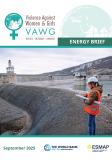Publications
Energy efficiency in public buildings in Turkey is currently at a low level. Energy use in the country’s public and service sectors experienced a five-fold increase between 2000 and 2015. Total green house gas (GHG) emissions increased by more than 120 percent from 1990 to 2015, constituting a significant environmental challenge. Several policy, regulatory, financial and technical barriers have prevented meaningful improvements to date.
The government of Turkey aims to substantially reduce its energy consumption in all strategic sectors of buildings, industry, and transport. Several legal requirements are in place for energy efficiency, such as the energy efficiency law, a regulation on energy performance in buildings, and regulation on increasing energy efficiency in the use of energy resources. In support of the government’s plan to curb energy consumption, the World Bank’s energy efficiency in public buildings project was approved on November 5, 2019, to demonstrate the renovation of a large share of the central government building stock, and develop sustainable financing and institutional mechanisms to support a scaled-up, national program for energy efficiency in public buildings in Turkey.
The project supports the renovation of central government and central-government affiliated buildings based on periodic calls for proposals to improve energy performance. Through these renovations and experiences, the government will develop a national program covering central and municipal buildings across the country and introduce sustainable financing and implementation schemes.
Canpolat,Ezgi; Casabonne,Ursula.2021. Gender Differences in Behavior and Perceptions of Energy Efficiency in Public Buildings in Turkey (English). Washington, D.C. : World Bank Group. http://documents.worldbank.org/curated/en/668791621584453024/Gender-Differences-in-Behavior-and-Perceptions-of-Energy-Efficiency-in-Public-Buildings-in-Turkey



